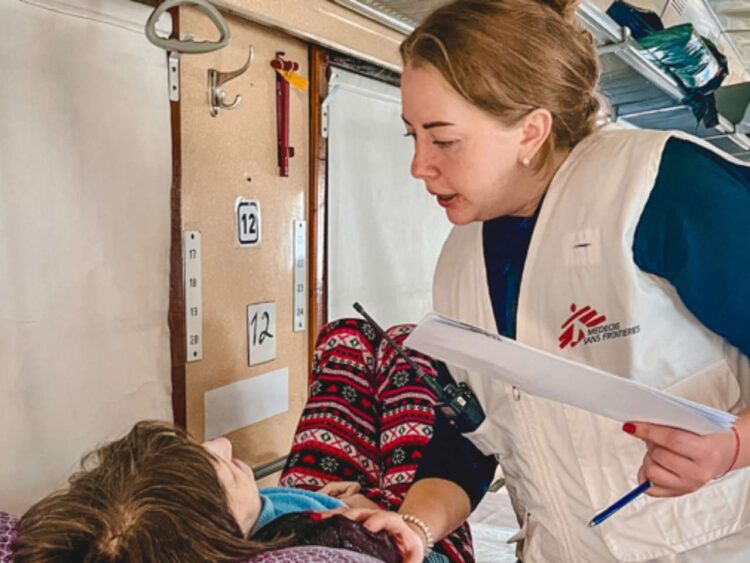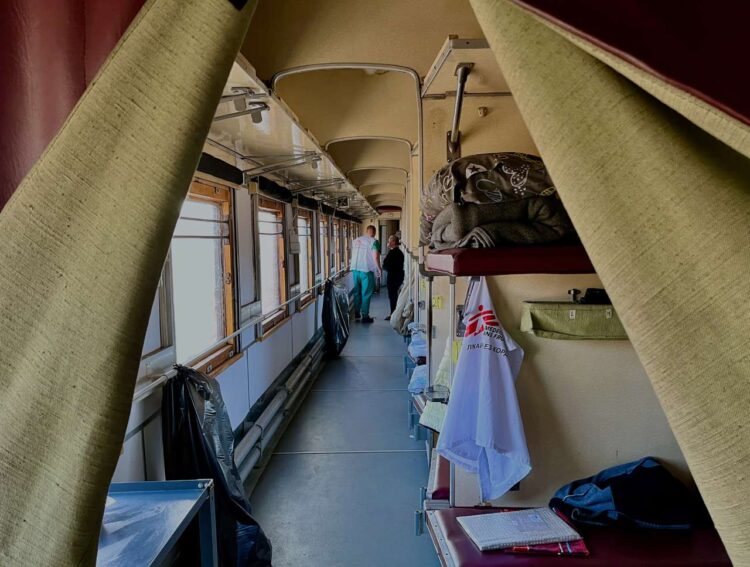Médecins Sans Frontières (MSF) is running a specially-adapted train to transport sick and wounded people as Ukraine continues to fight off Russia’s invasion.
A medical team works on board the train, and the British Medical Association (BMA) has published an interview with one of the doctors.
Seren Boyd interviewed Nataliia Pivovar and watched her working, tending to a seventeen-year-old, visually-impaired man who does not speak. He was in a hospital that Russian forces shelled, and is now being transported on what is known as a ‘medivac’ (medical evacuation) train.

MSF, also known as Doctors Without Borders, has been running this train since March 2022, soon after Russia began its full-scale invasion of Ukraine. Since then, it has transported thousands of sick and wounded civilians from areas near the frontline of the fighting close to safer areas in central and west Ukraine.
Working with the state-owned operator Ukrainian Railways and fifty railway workers, MSF significantly modified eight 1980s-built carriages, equipping them to provide specialist medical care for people who have war wounds, chronic diseases or mental health problems, or who are disabled. MSF describes the process of adapting the train carriages here.
MSF describes the train as “a cross between an ambulance and a state-of-the-art intensive care unit”. Two kilometres of electrical cables connect its intensive care unit to the generator. The train has made more than 130 journeys so far, adding, removing or reconfiguring carriages depending on the number and type of patients being transported. Dr Pivovar hells her interviewer that, “We have some equipment that is not even available in every hospital.”
As Dr Pivovar works, the train carries casualties away from Kherson on a 36-hour journey to western Ukraine. Kherson is the name of both a city and an administrative area (oblast) on the Black Sea, which is strategically important as a gateway to the Crimean Peninsula, which Russia annexed in 2014. Over recent months, Russian forces have heavily bombarded Kherson, and eighty per cent of the region’s healthcare facilities have been damaged or destroyed.
The BMA has again called for repeated its calls for combatants to respect the neutrality of healthcare services and professionals in Ukraine. However, it believes that the Russian military is targeting health facilities, with what it calls “blatant disregard for international humanitarian law”.
When a hospital comes under fire, it can be very difficult to evacuate patients to bunkers in time, so the Kherson regional health authorities called on MSF to help relocate them to other hospitals. As well as transporting him, MSF also provides medicines, hygiene kits and other essentials, and supports people in as well as replacing lost identity papers or finding work.
Paediatric anaesthetist Dr Pivovar said, “The front line is very close and we can hear explosions. Some elderly people have impaired hearing so they aren’t sure what’s going on. They ask us if everything is alright. I have to reassure them, saying, “everything is calm. It’s important to get on the train now, and we’ll soon take you to a safe place”.”
The doctor checks blood pressures and gives medication. She puts psychiatric patients on the lower bunks, explaining that, “It’s important for patients with psychiatric conditions to feel the floor under their feet. It makes them feel calmer.”

Most patients on the medical train travel with just a small bag. Dr Pivovar says that, “Some patients go to relatives, some go abroad, and for some our social workers try to help find dormitories and houses for them to live in.”
Dr Pivovar rescued her own grandmother from her village, which had been occupied by Russian forces. She says that, “People ask me if it will be safe at their new destination and if they will return. I think about my own grandmother and how difficult it is for the elderly to change their surroundings and living conditions.”
Dr Pivovar spent Christmas Day last year at the hospital in Kharkiv, in north-east Ukraine, where she works in the paediatric intensive care unit and the emergency department, and says, “Children in intensive care without their parents are very sad. So, you want to give them attention, entertain them, make them smile and give them small gifts. Their smiles are the most fantastic gratitude for our work.”
The doctor has never considered leaving Ukraine. She says, “we cannot predict when and where our help will be needed: we’re always ready to work. Admittedly, war causes sadness and does not allow us to celebrate holidays as before, but people can adapt to anything and find happiness in small things.
“Ukraine is a strong country and what is happening here with the war deserves to be known. I do not believe that the world will forget about Ukraine.”
To read the full interview, click here.






Responses